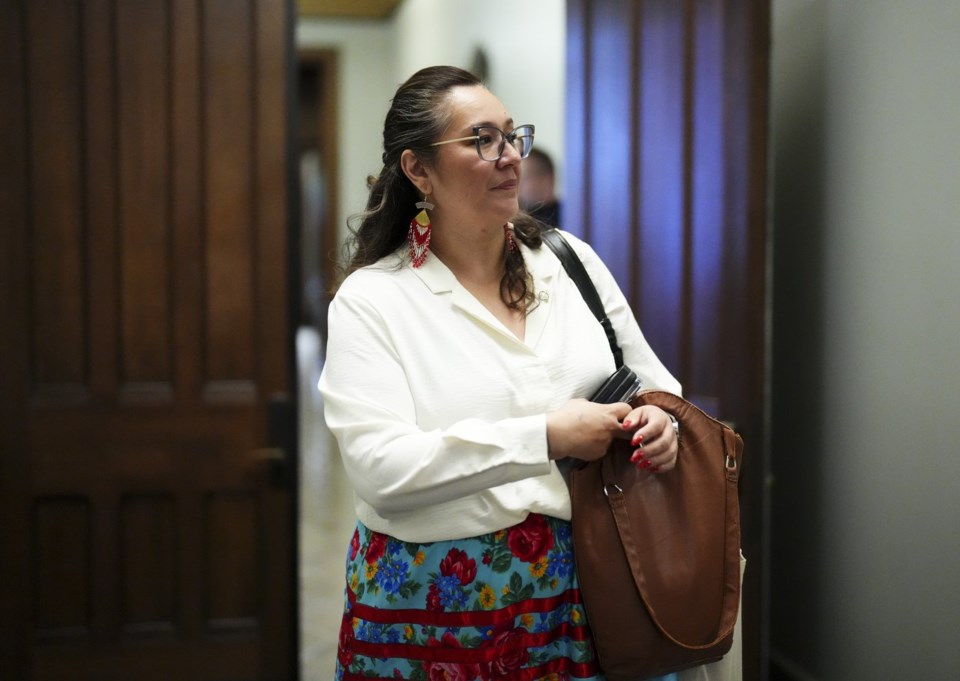OTTAWA — The federal minister of Indigenous services says she and the other Indigenous members of cabinet support their party's plan to fast-track infrastructure development — despite significant pushback from First Nations leaders.
Indigenous Services Minister Mandy Gull-Masty said Tuesday that Prime Minister Mark Carney has "reaffirmed" First Nations will be included in discussions about projects the federal government could fast-track under pending legislation, and that their input is "critical" to allowing those projects to move forward.
"Myself, as well as the other Indigenous members of cabinet, support this process," Gull-Masty said.
"We believe that the prime minister is taking the rights steps forward, having early engagement, having early dialogue with national leadership, but also directly with First Nations that are impacted by a project in territory."
The national chief of the Assembly of First Nations disagrees with that characterization, penning a letter to Carney on Friday saying the government is relying on it for consultations instead of going directly to rights-holding First Nations leadership.
The Assembly of First Nations is an advocacy body that lobbies on behalf of rights-holding First Nations governments through resolutions passed in annual general or special assemblies. Chiefs have yet to give it a mandate to work on its behalf on the current legislation, with the next assembly planned for July.
"In addition, the executive committee of the AFN at this point has had less than a week to review the small amount of information shared; and are seeking preliminary legal and policy advice relating to the proposal, such as it is," Cindy Woodhouse Nepinak wrote.
"Most importantly, it is not clear to the AFN whether or how the Crown has directly notified all First Nations rights holders on this matter as it should."
She continued that without proper engagement and consultations with rights-holders, the proposed legislation "will become marred in conflict and protracted litigation, because First Nations rights have once again been ignored."
Gull-Masty said she's "supportive" of Woodhouse Nepinak and that she's "pushing that conversation forward in a critical way."
"It's not about urgency — it's about quality when you're having that conversation," she said.
Liberal MP Jaime Battiste, a member of his party's Indigenous caucus, says his understanding is that all projects being examined now already have "buy-in" from Indigenous communities and will be the ones that are prioritized.
Phil Fontaine, the former national chief of the Assembly of First Nations, said Monday the federal, provincial and territorial governments are trying to demolish First Nations rights and interests as they move to accelerate project approvals in a way that does not “honour the First Peoples.”
He called for an emergency meeting with leadership from across the country to develop a list of demands for the federal and provincial governments.
The Union of B.C. Indian Chiefs issued a warning of its own Tuesday, saying it's "profoundly concerned" with the federal government's plans and the potential effect on First Nations women, girls and two-spirit people.
"The linkages between extractive industries and increased rates of gender-based violence are well documented," the group wrote in a media statement Tuesday, the sixth anniversary of the final report of the National Inquiry into Missing and Murdered Indigenous Women and Girls.
Amnesty International has long brought attention to what they call human rights violations against Indigenous Peoples during land defence operations in opposition to major projects like pipelines, and say Indigenous women face "immense risks and threats near resource extraction sites."
"The economic health of Canada requires a rights-based and gender-based analysis plus approach which upholds Indigenous women, girls and two-spirit+ people's rights to health, security and safety," the Union of B.C. Indian Chiefs said.
This report by The Canadian Press was first published June 3, 2025.
Alessia Passafiume, The Canadian Press



